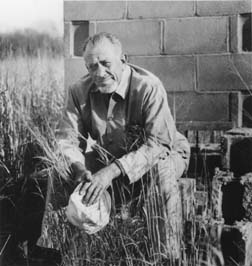
Ο Αμερικανός συγγραφέας Τζον Έρνστ Στάινμπεκ [John Ernst Steinbeck], γεννήθηκε στο Salinas της Καλιφόρνιας στις 27/2/1902 και πέθανε στη Νέα Υόρκη στις 20/12/1968. Βραβείο Νόμπελ Λογοτεχνίας 1962. Το ανέβασμα στη σκηνή του γνωστού έργου του Άνθρωποι και ποντίκια [Of Mice and Men, 1937] του απέφερε το Βραβείο των Θεατρικών Κριτικών. Το 1942 παρουσιάστηκε το έργο του Το φεγγάρι έδυσε [The Moon is Down], του οποίου η δράση εξελίσσεται στην Ευρώπη κατά τη διάρκεια της ναζιστικής κατοχής. Μια νουβέλα του, Η κοιλάδα της Τορτίλα [Tortilla Flat, 1935] διασκευάστηκε για το θέατρο και παρουσιάστηκε το 1938, ενώ το Λάμψη φλόγας [Burning Bright, 1950] είχε μέτρια απήχηση. Το μιούζικαλ των Ρότζερς και Χαμερστάιν Pipe Dream [1955] βασίστηκε στη νουβέλα του Στάινμπεκ Γλυκιά Πέμπτη [Sweet Thursday].
John Steinbeck
Και το παρακάτω κείμενο από την Encyclopædia, Britannica, Inc.
American novelist, best known for The Grapes of Wrath (1939), which summed up the bitterness of the Great Depression decade and aroused widespread sympathy for the plight of migratory farm workers. He received the Nobel Prize for Literature for 1962.
First-edition dust jacket of The Grapes of Wrath by John Steinbeck (1939); artwork by Elmer Hader.
Steinbeck attended
Steinbeck's first novel, Cup of Gold (1929), was followed by The Pastures of Heaven (1932) and To a God Unknown (1933), none of which were successful. He first achieved popularity with Tortilla Flat (1935), an affectionately told story of Mexican-Americans. The mood of gentle humour turned to one of unrelenting grimness in his next novel, In Dubious Battle (1936), a classic account of a strike by agricultural labourers and a pair of Marxist labour organizers who engineer it. The novella Of Mice and Men (1937), which also appeared in play and film versions, is a tragic story about the strange, complex bond between two migrant labourers. The Grapes of Wrath won a Pulitzer Prize and a National Book Award and was made into a notable film in 1940. The novel is about the migration of a dispossessed family from the Oklahoma Dust Bowl to

A 1965 photo of author John Steinbeck: This 1965 file photo shows author John Steinbeck, winner of the 1962 Nobel Prize for literature. A son and a granddaughter of Steinbeck hold the publishing rights to 10 of his early works, including "The Grapes of Wrath" and "Of Mice and Men," a federal judge has ruled, turning away a publishing house and others who claimed the rights. U.S. District Judge Richard Owen said in a 10-page order dated Thursday, June 8, 2006 that the rights properly belong to the author's son, Thomas Steinbeck, and granddaughter Blake Smyle. (AP Photo/File)
After the best-selling success of The Grapes of Wrath, Steinbeck went to

Photograph by Hans Namuth, courtesty of the estate of Hans Namuth.
Steinbeck's later writings were comparatively slight works of entertainment and journalism interspersed with three conscientious attempts to reassert his stature as a major novelist: Burning Bright (1950), East of Eden (1952), and The Winter of Our Discontent (1961). In critical opinion, none equaled his earlier achievement. East of Eden, an ambitious epic about the moral relations between a
Steinbeck's reputation rests mostly on the naturalistic novels with proletarian themes he wrote in the 1930s; it is in these works that his building of rich symbolic structures and his attempts at conveying mythopoeic and archetypal qualities in his characters are most effective.

Ο Τζον Στάινμπεκ, ενώ παραλαμβάνει το Νόμπελ Λογοτεχνίας
ΚΙ ΑΥΤΑ: Biographies and critical studies include Jackson J. Benson, The True Adventures of John Steinbeck, Writer (1984, reissued 1990); Jay Parini, John Steinbeck (1994); Roy Simmonds, John Steinbeck: The War Years, 1939–1945 (1996); Warren French, John Steinbeck, 2nd ed., rev. (1975, reissued 1984); Paul McCarthy, John Steinbeck (1980); R.S. Hughes, John Steinbeck: A Study of the Short Fiction (1989); John H. Timmerman, The Dramatic Landscape of Steinbeck's Short Stories (1990); and Donald R. Noble (ed.), The Steinbeck Question: New Essays in Criticism (1993).

No comments:
Post a Comment